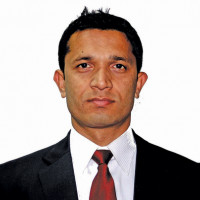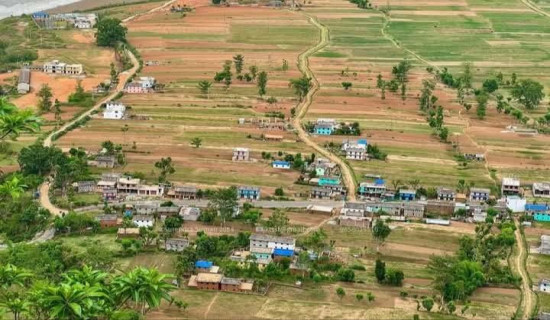- Monday, 16 February 2026
Budget formulation at final stage
Kathmandu, May 23: The Ministry of Finance (MoF) is in the final phase of preparing the budget statement for the fiscal year 2082/83 (2025/26).
The Ministry is actively working on the budget by taking into account suggestions received from various sectors, it said in a statement on Thursday.
As per the constitutional provision, Deputy Prime Minister and Minister for Finance, Bishnu Prasad Paudel, will present the budget at the joint session of the Federal Parliament on May 29 (Jeth 15 in Nepali calendar) on the Republic Day.
The Economic Survey will be presented in Parliament on May 28, a day before the budget statement.
According to the Ministry's spokesperson, Shyam Prasad Bhandari, the budget formulation is being carried out with due consideration of the country’s needs, public expectations, the limitations of available resources, and the suggestions received from stakeholders.
DPM Paudel, along with his team, is fully focused on drafting the budget.
The government's policies and programmes and principles and priorities of the upcoming budget have already been presented at separate joint sessions of the Federal Parliament.
The thematic priorities for the budget include economic reform, job creation, development of the digital economy, infrastructure development, and social security.
Stakeholders of the economy and other sectors have suggested the government to make the budget realistic and actionable. Major suggestions include focusing on few large and ongoing projects of national pride, expanding revenue base, emphasising job creation and equitable development, and promoting the private sector-led growth.
Development of industrial infrastructure, export promotion, tax reform, promotion of digital economy and energy security are other major demands of the private sector. One and all have suggested to create environment for energy security and policy stability, if not political stability.
The government has also clearly stated in the policy documents that the High-Level Economic Reform Advisory Commission led by former Finance Secretary Rameshwore Khanal would be put into implementation with priority.
Khanal has suggested to prioritise redesigning and reconstruction of the social security programmes, checking the practice of announcing distributive budget and scattering the meagre resources available.
According to him, the government and private sector should mobilise their resources in harmony to promote capital formation and create opportunities for people. Khanal stressed on trust-based system to achieve the national aspiration for development.
Other priority suggestions from the Commission include not transferring the senior government officials for at least two years, completing sick national projects, enhancing the capacity of construction entrepreneurs and easing Environmental Impact Assessment.
Meanwhile, there is a need to devise a strategy to implement the budget and utilise the resources properly. As the current Fiscal Year 2024/25 is about to end, the government has been able to utilise only about 36 per cent of the development budget.
Similarly, the gap between the government receipt and expenditure is ever widening. By Wednesday, the gap has crossed Rs. 211 billion.
As part of the preparation process, the MoF has held consultations with government ministries, departments, the National Planning Commission, political parties, elected representatives, and subject matter experts. Minister Paudel also held discussions with key political leaders, including Nepali Congress President Sher Bahadur Deuba and CPN (Maoist Centre) Chairman and Leader of the Opposition Party, Pushpa Kamal Dahal Prachanda.
Likewise, it consulted former finance ministers, former finance secretaries, economists, and representatives from major business organisations such as the Federation of Nepalese Chambers of Commerce and Industry (FNCCI), Confederation of Nepalese Industries (CNI), and Nepal Chamber of Commerce (NCC).
Discussions were also held with development partners. Additionally, elected representatives, office-bearers of various institutions, and members of the public provided their inputs to the Ministry. The Ministry of Finance had publicly invited suggestions related to the upcoming budget.

















